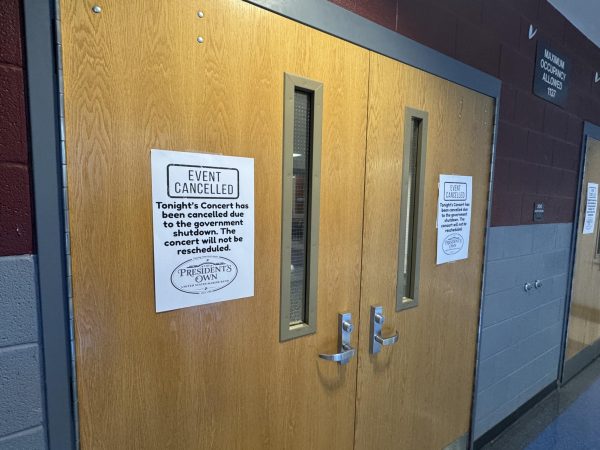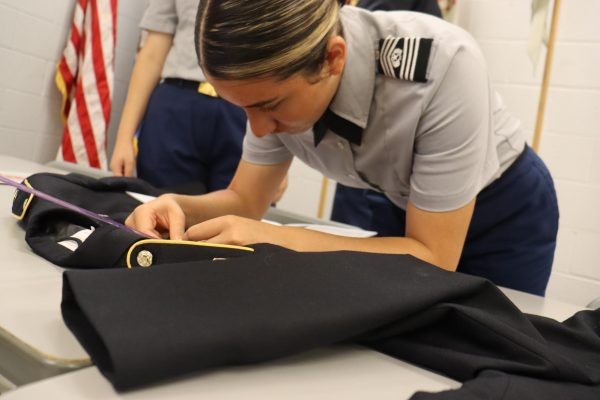Jordan Peele’s Us is a funhouse of thrills and horrors
Lupita Nyong’o, Shahadi Wright Joseph and Evan Alex as Adelaide, Zora and Jason Wilson in the film Us.
America was not prepared for the frighteningly relevant film Get Out. Writer-director Jordan Peele’s Get Out was a horror satire that sharply explored racial relations in America. The film garnered Peele an Oscar win for Best Original Screenplay and became a cultural phenomenon with critics and audiences alike. After months since the film’s release, many including myself were eager for Peele’s follow-up project to see what he’d do next. With the home-invasion horror film Us, I can happily say that Peele is no one-hit wonder and exceeds expectations yet again. Us whips up a spine-tingling tale that boasts murderous doppelgangers, symbolic imagery and political metaphors that will leave viewers scratching their heads and dissecting the film days after watching it.
Us’s prologue begins at a carnival in Santa Cruz, a beach in California, during 1986. While on a family trip, a young Adelaide (Madison Curry) has a candied apple clutched to her side, sporting a Michael Jackson’s Thriller t-shirt and is preoccupied with curiosity. Despite being on screen for a limited amount of time, Curry manages to draw you in with her performance. As an elementary-age actress, she has an expressive yet hypnotic demeanor which is impressive for someone her age. Alone, after wandering off from her parents, she is enthralled by a flashy carnival attraction advertising an opportunity to “find yourself.” Inside the mysterious hall of mirrors, Adelaide is greeted by an unsettling duplicate of herself and flees from the jarring encounter. This is a traumatic experience that will continue to haunt her.
Flash forward to present day, Adelaide (Lupita Nyong’o) and Gabe Wilson (Winston Duke) retreat to their coastal beach house in southern California with children Zora (Shahadi Wright Joseph) and Jason (Evan Alex). The bird’s-eye view is utilized to introduce the Wilsons as they drive off to their vacation home, which gives a nod to the classic horror film The Shining, a film that Peele references on numerous occasions. Gabe and the kids seem excited, with the exception of Adelaide who is bothered by unease due to her encounter at the nearby carnival from many years ago. Even the presence of the family’s friends, Josh and Kitty, (Tim Heidecker and Elisabeth Moss) aren’t enough to soothe her mind. Unfortunately, Adelaide’s worst fears are yet to come.
Us excels at balancing tones and moods, primarily due to Peele’s brilliant mind as a screenwriter. The film begins with an intense opening and then transitions to a middle-class family cracking jokes, which works as it kept myself feeling at ease during this portion of the film. Fortunately, the humor doesn’t come off as unnatural or out of place. This is because of the well-written script and Winston Duke’s performance as the goofy dad that keeps Us from taking itself too seriously. Duke adds much-needed levity to an otherwise intense film with an array of embarrassing dad jokes and an incomprehension of dealing with the family’s situation. Peele smartly incorporates humor as a method of deflection, so when the terror kicks in, it gets you off-guard and leaves the thought of not knowing if you’re gonna laugh or scream next.

The Tethered stand eerily outside the Wilson’s family driveway during a scene in the film Us.
“There’s a family in our driveway,” are words uttered by the youngest of the family, Jason, as he explains to his parents what he just saw. The family looks out the window only to discover four shadowy figures standing eerily in their driveway. With tension ratcheting and a fluid steadicam in the gist of it, the whole sequence is a master class of suspense. Peele is reluctant to resort to jump scares to fill audiences with fear. He prefers establishing a sense of dread in these creepy scenarios and unnerving circumstances. This is when mayhem unleashes. The shadowed figures turn out to be exact replicas of the Wilsons (also played by the same actors) dressed in red jumpsuits all wielding pairs of golden scissors. They call themselves the Tethered. An ambush occurs and the sinister doubles usher their less evil counterparts into the living room. The Wilsons’ night turns into a complete nightmare, but that won’t prepare them for the horrors that they will endure later.
Each of the family members has their own chilling double, however, it’s Nyong’o’s acting abilities with her double that steals the show for me. Her mannerisms and movements add a load of depth to both characters and shows off her astounding acting range. On one side of the spectrum, Nyong’o embodies a mother trying to protect her children while grasping with the anxiety-inducing unknown. With her character’s double, she becomes the most unnerving aspect of the film only through opening her mouth with a croaky, broken voice. Horror films aren’t commonly known for their outstanding performances, mostly because the characters are one-note and underdeveloped. However, Nyong’o has the task of playing two different characters, which is no easy feat. A captivating dynamic occurs between the two that adds almost a psychological aspect to the film, which kept me interested in discovering more about these opposite characters. I appreciate Peele’s devotion to adding humanity and layers to each of his characters, which Nyong’o takes to another level and absolutely runs with it.
Us is revolved around a family, so naturally the children get a fair chance to shine as well. I was skeptical to see how the younger actors would perform, only to receive genuine and frightening performances from the two children. Zora is a typical teenager glued to her phone, while her double shares a wide, creepy smile with the ability to run at fast paces. Jason is the precocious young son who prefers to wear a mask for no particular reason, on the other hand, his doppelganger has a mask for a disturbing reason. Zora and Jason are crafted in a way that separates them from being a pair of vulnerable characters, as they must also face off against their own doppelgangers. It’s refreshing to see younger characters fleshed out more and becoming one of the shining aspects of a film.
The dazzling amount of horror imagery is largely due to cinematographer Mike Gioulakis, who recently shot David Robert Mitchell’s It Follows, as well as, M. Night Shyamalan‘s Split and Glass. Visually, the film has a lot of elements that hint and symbolize a larger picture with the doppelgangers. Earlier in the film, the Wilson family walks across a beach with half of the screen capturing their moving bodies and the other half containing their shadows close to their side. It’s a conspicuous image that draws a sense of foreshadowing of the impending doom awaiting for the family. Along with Peele, Gioulakis knows how to create a sense of dread with every foreboding moment. Whether it’d be a hall of mirrors or a beach house, the two bring forth an unforgettable set of horrific visuals

Lupita Nyong’o plays the protective mother Adelaide Wilson in the film Us.
As a true horror cinephile, Peele scatters Us with nods and references to old-school horror films such as Jaws, A Nightmare on Elm Street and The Shining. Us clearly echoes of these timeless classics, showing that Peele acknowledges his own inspirations for the film. Among other noteworthy aspects, Michael Abel’s score manages to be a stellar accomplishment. The score provoked me with a sense of sheer terror throughout the film and truly conveys the film’s spirit. In particular, Anthem is a representation of the Tethered and supposed to reflect their venomous hatred. The composition was created through an assortment of instruments and a chorus with no distinct language. After hearing the musical piece, goosebumps were immediately sent across my body. Abel’s chilling score is unlike anything that I’ve heard before.
Peele’s follow-up effort is far more ambitious than Get Out. The metaphors and references about racial relations in Get Out are what made it such a thought-provoking and relevant film. Peele continues to hint at deeper issues within the film such as social class, which the audience is able to discover as they rearrange the pieces together. His ideas brilliantly critique the socio-economic problems within America in a resonant, unsettling fashion. Unfortunately, this is where the film falls into a muddled mess. While his ideas are in good intention, Peele can’t stop himself from adding too many metaphors that only begin to pile up at the end. Us then falls into a hole of contradictory logic and unanswered questions, which left me wishing that Peele would have revised his plethora of ideas one last time.
Us seemingly plays out like an extended episode of The Twilight Zone, which ironically Peele is slated to host the upcoming revival of the classic series. With Us, Peele will have you on the edge of your seat and wondering what will happen next. There’s an idea explored about the U.S. or us within the film, an idea that leaves you terrified of ourselves and questioning the society around us. Only a passionate, auteur director could invoke that type of discussion through his films and with that, I am gladly looking forward to Jordan Peele’s next nightmare.
Your donation will support the student journalists of Harrisonburg High School. Your contribution will allow us to purchase equipment and cover our annual website hosting costs.











